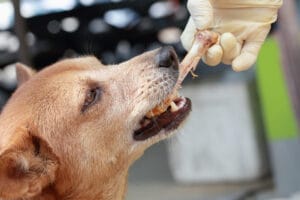Ear infections are a prevalent issue in dogs, frequently seen in animal hospitals. These infections can be painful and often indicate deeper health problems. This article covers symptoms to watch for and tips to help prevent ear infections in your dog.
Symptoms of Canine Ear Infections
Recognizing the signs of an ear infection early can lead to quicker treatment and less discomfort for your dog. Look out for these symptoms:
- Head shaking
- Head tilting towards the affected ear
- Scratching or pawing at the ears
- Rubbing ears on furniture or carpets
- Hot ears
- Odorous ears
- Waxy discharge
- Crusty, scabby, or red, irritated skin inside the ear flap
In severe cases, particularly with middle or inner ear infections, your dog may also experience:
- Hearing loss
- Loss of balance
- Walking in circles
- Dry eye
- Nystagmus (quick side-to-side eye movements)
- Drooping of eyelids or mouth, drooling indicating nerve damage
Causes of Ear Infections in Dogs
Ear infections usually point to a deeper issue. Here are some common causes.
- Yeast Overgrowth: Yeast naturally exists in healthy ears but can overgrow, leading to infections. A yeasty smell, along with yellow, waxy, or crusty discharge, often indicates yeast overgrowth, frequently due to food allergies.
- Diet: A highly processed diet rich in carbohydrates can feed yeast, leading to an imbalance. Switching to high-quality, fresh food can help prevent ear infections.
- Bacterial Infection: These infections often produce a foul-smelling, yellow, or light brown discharge and require a culture to ensure the correct antibiotic is prescribed.
- Moisture from Swimming or Bathing: Excessive moisture can create a breeding ground for yeast and bacteria, particularly in dogs with floppy ears.
- Breed Susceptibility: Dogs with floppy ears, such as Poodles and Cocker Spaniels, are more prone to ear infections due to trapped moisture and secretory glands.
- Foreign Bodies: Grass seeds, foxtails, ticks, and excess dirt can cause irritation and overgrowth of bacteria or yeast, though this is less common.
Diagnosis
If you suspect an ear infection, take your dog to the veterinarian. They might perform a culture or bloodwork to identify the type of infection and any underlying causes. Chronic conditions or suspected tumors might require a video otoscope for further examination.
Treatment
- Diet: Eliminate ultra-processed kibbles and treats, switching to a fresh diet. Gut health is crucial for overall immunity, and a healthy gut can prevent ear infections. Incorporate:
- A fresh, species-appropriate diet
- High-quality pre and probiotics
- Digestive enzymes to aid gut flora recovery
- Topicals for Ears: Depending on the infection, your veterinarian might recommend topical antibiotics or anti-yeast drops. Natural cleaning agents include:
- Witch hazel
- Organic apple cider vinegar mixed with purified water
- Green tea or calendula infusion
- A mixture of tea tree oil and coconut oil (for dogs only)
- Oral Medications: If necessary, your veterinarian might prescribe medications for your dog.
Prevention
- Feed a high-quality, species-specific fresh diet, avoiding processed foods.
- Provide a daily high-quality pre and probiotic.
- Add omega-3 supplements to your dog’s diet.
- Thoroughly dry your dog’s ears after swimming, rain exposure, or baths.
- Use cotton in your dog’s ears during baths to prevent water entry.
- Keep ears clean with natural cleaners.
Ear infections are a common, painful condition that can lead to more significant health issues if untreated. Quick treatment is essential, and understanding the root cause can help prevent recurrence. Think of ear infections as a signal of deeper health issues needing attention.
than just administering ear drops every time it recurs. Think of an ear infection as the body sounding an alarm that something deeper is occurring.




















